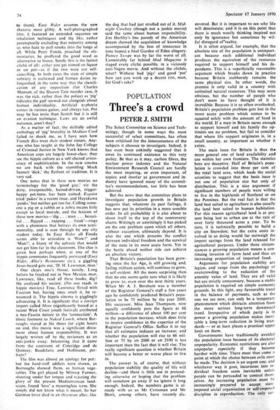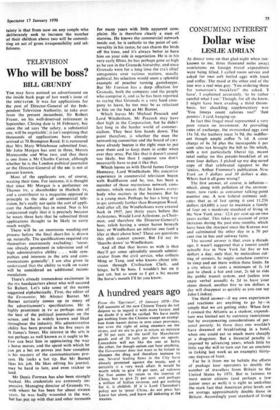POPULATION
Three's a crowd
PETER J. SMITH
The Select Committee on Science and Tech- nology, though in some ways the most successful of select committees, has often been criticised for the innocuousness of the subjects it chooses to investigate. Indeed, it has even been unkindly suggested that it owes its continued existence to this very policy. Be that as it may, carbon fibres, the nuclear power industry and the Natural
Environment Research Council are hardly the most inspiring, or even important, of
topics; and insofar as government and in- dustry have ignored many of the commit- tee's recommendations, too little has been achieved.
But the news that the committee plans to investigate population growth in Britain suggests that, whatever its past failings, it has now put its priorities in a more sensible order. In all probability it is also about to shoot itself to the top of the controversy charts. Wittingly or unwittingly it has picked on the one problem upon which all others, without exception, ultimately depend. It is also the one which presents the conflict between individual freedom and the survival of the state in its most acute form. Yet in the battle ahead neither side can achieve an absolute victory.
That Britain's population has been grow- ing since the Ice Age, is still growing and, failing militant action, will continue to grow, is self-evident. All the more surprising then that no one seems quite sure what it is likely to grow to, even over the next thirty years. When Mr A. J. Boreham was a member of the Registrar General's staff a few years ago he confidently predicted Britain's popu- lation to be 75 million by the year 2000. His successor, Miss Jean Thompson, now equally confidently puts the figure at 66 million—a difference of about 100 per cent in the population increase, which does little to inspire confidence in the expertise of the Registrar General's Office. Suffice it to say that all estimates indicate an increase; and whether the population will rise to 66 mil- lion or 75 by AD 2000 or AD 2100 is less important than the fact that it will rise. The really significant question is whether Britain will become a better or worse place to live in.
The answer is, of course, that without population stability the quality of life will decline—and there is little use in pretend- ing otherwise or hoping that the problem will somehow go away if we ignore it long enough. Indeed, the numbers game is al- ready with us as Mr Crossman and Mr Short, among others, have recently dis- covered. But it is important to see why life will deteriorate; and it is on this point that there is much woolly thinking inspired not only by ignorance but sometimes by wil- ful disregard orreality.
It is often argued, for example, that the absolute size of the population is unimport- ant because each additional individual produces the equivalent of the resources required to support himself and his de- pendants. This is a superficially reasonable argument which breaks down in practice because Britain stubbornly remains the same physical size. In other words, the premise is only valid in a country with unlimited natural resources. This may seem obvious, but the number of people who don't seem to have thought of it is incredible. Because it is so often overlooked, Britain's population problem gets lost in the more acute problem which comes to be equated solely with the amount of food in the world. If a man in Britain earns enough to support himself and his family the op- timists see no problem, but fail to consider that where life support originates is, in a small country, as important as whether it exists.
The main issue for Britain is thus th• more general one of land availability and use within her own frontiers. The statistics here are deceptive. Half of Britain's popu- lation is crowded into three per cent of the total land area, which leads the social scientists to suggest that the basic issue is not one of population size but only of distribution. This is a nice argument if significant numbers of people were willing to live in the highlands of Scotland or on the Pennines. But the real fact is that the land best suited to agriculture is also usually the land best suited to human habitation. For this reason agricultural land is at pre- sent being lost to urban use at the rate of over forty thousand acres a year. To be sure, it is technically possible to build a city on Snowdon; but the extra costs in- volved in so doing would far outweigh the import savings from the land released for agricultural purposes. Under these circum- stances a growing population means a con- tinuing invasion of farm land and thus an increasing proportion of imported food.
Arguments for population stability are legion, and range from the psychology of overcrowding to the reduction of the amenity value of land. They are all valid but are strictly unnecessary, because a stable population is required on simple economic grounds. In this light, any favourable trend in the balance of payments, such as the one we see now, can only be a temporary phenomenon which distracts attention from the more serious long-term downward trend. Irrespective of which party is in power a growing population makes inevi- table a long-term reduction In living stan- dards — or at least places a practical upper limit on them.
Governments have traditionally avoided the population issue because of its electoral unpopularity. Economic restrictions are also unpopular especially if they become harsher with time. There must thus come a point at which the choice between evils must be made. The decision is an urgent one; and whichever way it goes, incursions into in- dividual freedom seem inevitable unless people can be persuaded to control them- selves. An increasing population must be increasingly prepared to accept state- imposed social organisation or self-imposed discipline in reproduction. The only cer-
tainty is that from now on any couple who deliberately seek to increase the number of their children above two will be commit- ting an act of gross irresponsibility and sel., fish ness.



































 Previous page
Previous page